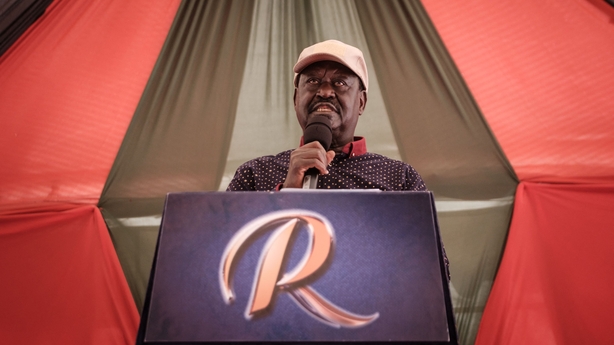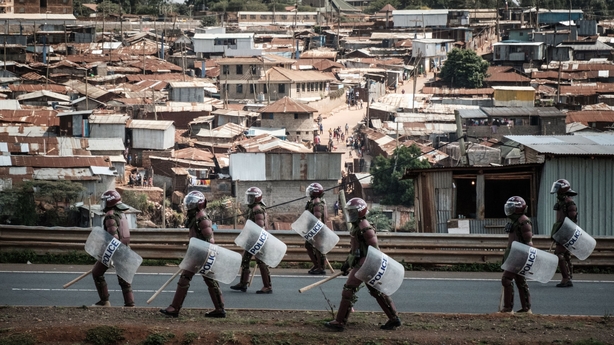Across Kenya, citizens woke up to a third wave of protests and civil unrest, as demonstrators vowed to hold the country's government accountable for cost-of-living increases.
The stench of burned rubber filled Kibera, Nairobi's largest slum, as protestdrs set mounds of tyres alight to block off streets.
In Nairobi's Mathare area, protesters used catapults to launch stones at police, while authorities used tear gas in other areas to disperse growing crowds.
In Kisumu, Kenya's third-largest city, black arid smoke filled the air as protesters set fires on roads flanked by motorists hooting in support.
With many struggling to feed their families, today has been dubbed Maandamano Thursday, or Protest Thursday.
For some, it is a chance to bring violence to the streets of Nairobi. But, for many, it is an opportunity to air grievances about a government they feel has let them down.
Kenya's opposition leader, Raila Odinga, has called for weekly anti-inflation protests. Mr Odinga, a former prime minister, is also disputing the results of last year’s presidential election.
David Onyoni, a taxi driver who works in Nairobi, told RTÉ News that Kenyans would be protesting no matter what.

"Even if Raila dies today and is buried tomorrow, we are going to go ourselves on the road," he said.
"We are not going to be asked by anybody."
Mr Onyoni said the government should not be surprised by the rebellion of its citizens.
"You can think it’s politics, but Kenyans are suffering."
This week, the protests gained momentum after Prof Peter Anyang Nyongo, the governor of Kisumu, suspended protests in his own county and urged supporters of Mr Oding to travel to the protests in Nairobi.
The Governor of Nairobi, Johnson Sakaja, criticised the move, saying it would bring mayhem and destruction to the capital city.
While a consensus was reached to continue the protests in the different cities, Prof Anyang Nyongo made it clear that supporters would still take to the streets in large numbers.
"We are encouraged by the resolve of our people to continue with the demonstrations," he said.
The threat of fierce violence loomed over the day, with many hoping that there would be no repeat of the first day of protests, which saw buildings damaged and clashes between protesters and police.
Mary Kimani’s son is partaking in the protests. She told RTÉ News that she feared for his safety, even if things were calmer today.
"Even if I agree with them, people always get hurt in these things. I could not tell my son not to go, so I just have to wait till he comes home," she said.

"We are struggling. My son is trying to find work. I have to look after my children. The government needs to help us."
Since the protests began, Mr Odinga has promised his supporters, that they will not rest until the government listens to their demands.
Mr Odinga’s party has blamed President William Ruto for scrapping subsidies for petrol, electricity and food.
In February, inflation rose to 9.2%, with the prices of some fruit and vegetables rising by as much as 11%.
Protesters are also angry at the fuel shortage, which pushed prices to an all-time high.
Earlier this month, a university student in western Kenya was shot dead by police officers who fired live rounds when they ran out of tear gas and blank ammunition. And, this week, a man was shot dead in Kisumu during protests.
More than 230 people have been arrested since the protests began, including four members of parliament who were arrested on the first day.
Martin, a man who works at a kiosk that sells essential items in Nairobi, told RTÉ News that the government had promised to tackle the cost of living.
He has partaken in the protests since the beginning.
"We cannot afford food. There are no jobs," he said.
"We are not here to destroy things. We don’t want any violence, but we won't stop protesting."







